‘As if she had never existed’: The graveyards for murdered women
In the Kurdish region of northern Iraq, female victims of ‘honour killings’ lie buried in unmarked graves, denied even their names in death, but Kurdish feminists are fighting back.
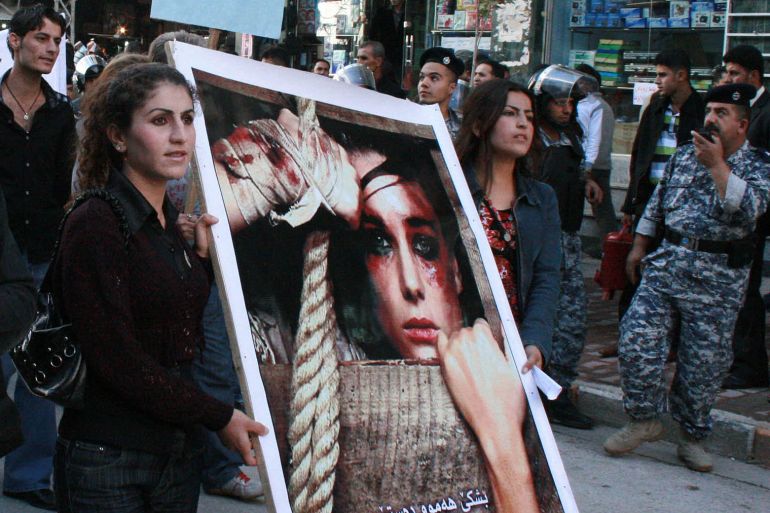
Naza* is visiting her daughter’s grave in an unmarked section of a cemetery in Sulaymaniyah, in the Kurdish region of northern Iraq. She goes there in secret – the girl’s death has been shrouded in a veil of family shame, so much so that her grave is unmarked.
The reason? “My beautiful girl was killed by her cousin when she refused to marry him,” Naza says.
Keep reading
list of 4 itemsIt is time for a system overhaul in Iraq’s Kurdish region
Kurd vs Kurd: Fears of full-scale war rise in northern Iraq
What Biden can and cannot do for the Kurds
“Nothing happened to him. The police took his word that he was innocent. Then, because the elders said she had brought disgrace, they put her in a grave with no name, no headstone, as if she had never existed.” Naza is accompanied by her 15-year-old son, who must also come here in secret.
“I see other mothers, and once even a father, always weeping and looking heartbroken,” Naza tells me. “Having to sneak around in the middle of the night to visit my daughter’s grave turns my pain into constant agony.”
Because of the secrecy with which they must visit their murdered loved ones’ graves and the potential backlash from family and community members, most of the women I spoke to preferred not to give their names.
Another woman – whose sister had been murdered – I met at the graveyard said she had been told by a male community leader that the deceased was “lucky” to have anywhere to “lay her bones after what she had done [run away from a forced marriage]”. He said: “She should be ground into the earth, like powder.”
Another visitor to the graveyard described feeling as if the place was holding “the living dead – souls crying out in pain”.
There are cemeteries like this in several parts of the Kurdish region of northern Iraq, full of the unmarked graves of women and girls who have been murdered by male relatives in the name of “honour”.
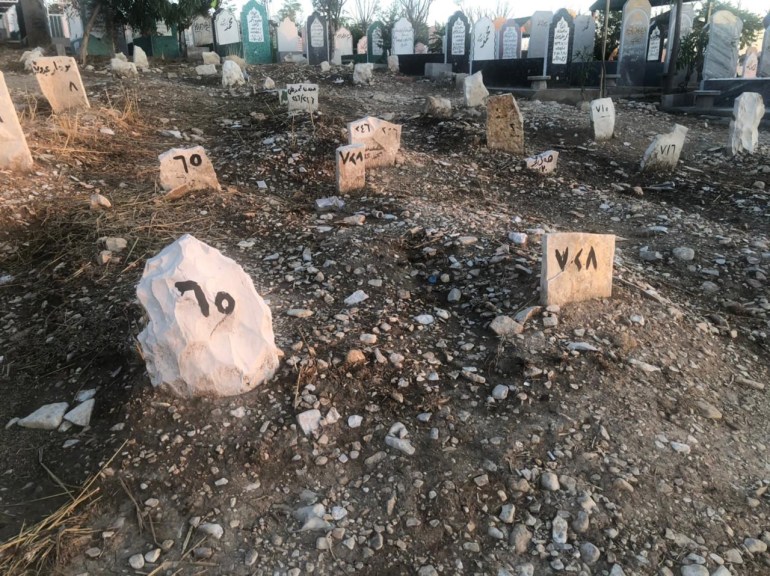
Since the 1991 uprising of the Kurdish region, which spans a number of different internationally-recognised countries, including Turkey, Syria, Iran and Iraq, more than 20,000 Kurdish women have been killed in so-called “honour crimes”.
There are moves to address the existence of these graves. Through the efforts of grassroots women’s rights organisations in the semi-autonomous Kurdish region, such as the Sofia Society, attention is starting to focus on the issue of “honour crimes”.
Qubad Talabani, the deputy prime minister of the Kurdistan Regional Government (KRG), is one person in a position of power who has taken notice. On the International Day for the Elimination of Violence Against Women in November last year, Talabani visited the cemetery I saw – a bleak, bare space with no flowers, photographs or epitaphs. I spoke to him about it.
“This is a form of violence that continues to torment these women even after their deaths,” he explained. “By being buried with no respect or recognition, they did not afford this poor victim respect, even in death. That aspect of this crime really hurt me and made me want to act.
“As an official, as a Kurd and as a man, I feel ashamed that such crimes can be carried out by my countrymen against women. The fact that these victims lie in unmarked graves just adds insult to injury. There is never honour in the murder of women, only shame. Shame on the perpetrator and shame on the society that tolerates such acts.”
Within the Kurdish tradition, family members would normally be buried within the same graveyard, but not in the cemeteries for the victims of “honour killings”. Mothers are not allowed to be buried with their daughters, and the bodies lie unmarked and alone.
There are many women in political positions in the KRG. The head of the Kurdistan Regional Parliament and Ministry of Social Affairs are women, as well as the entire Council of Women’s Affairs. There is a 30-percent quota for female members of parliament, and numerous women’s rights organisations and NGOs are supported by the government.
But Houzan Mahmoud, a Kurdish feminist who grew up during the rule of Saddam Hussein and now lives between Germany and the UK, believes: “The problem is that many of these women are tokens, and their roles are largely symbolic.”
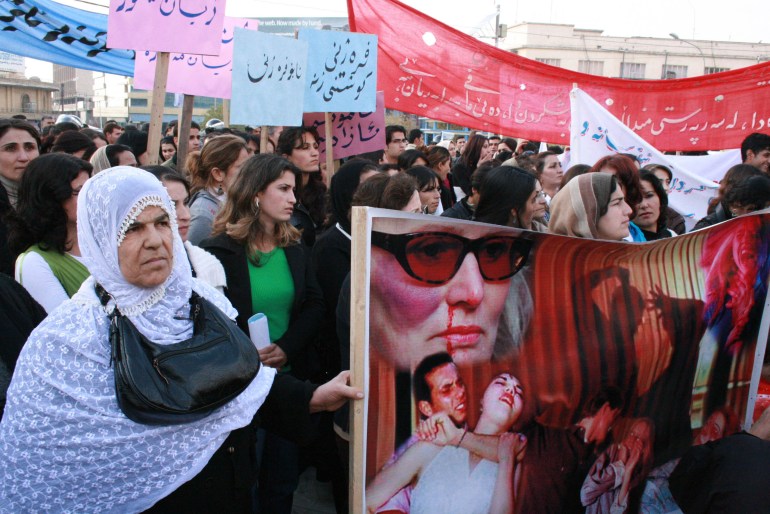
‘We are here to stop them getting away with it’
I first heard Mahmoud speak in the UK about a women’s revolution going on in a region known as Rojava, northeast Syria, in 2015. Beginning as a Kurdish struggle for national liberation more than 40 years ago, it had gradually morphed into a movement that combined a critique of and resistance to patriarchy and capitalism.
The women, Mahmoud explained, sought ways to live collectively and cooperatively, something that spoke to me as a feminist who, since my teenage years in the 1970s, had aspired to this.
Inspired, I began to make contact with other Kurdish feminists and, in 2019, was invited to speak at a conference on sexual violence against women and girls in Sulaymaniyah.
This was when I got to know the Sofia Society – the event organisers – a group of about 40 young Kurdish feminists founded in 2016 by Lanje Khawe, a lawyer in her late 20s. The event was attended by hundreds of women and men, including Deputy Prime Minister Talabani.
The Sofia Society was founded with the primary aim of increasing literacy among girls and young women in small towns and villages in the area. Sofia activists travel on bicycles, often for many miles, to reach girls living in the most secluded areas.
Group members say libraries in the Kurdish region are considered a largely male environment and are far from female-friendly. “Many young girls are desperate for books,” explains Ferah*, a member of Sofia. “We are keen to meet this demand because we know that many will read in secret.”
I was told many families forbid girls to read in libraries because they think they may rebel against patriarchal norms. “How can we be free when this basic right is denied us,” asks Ferah.
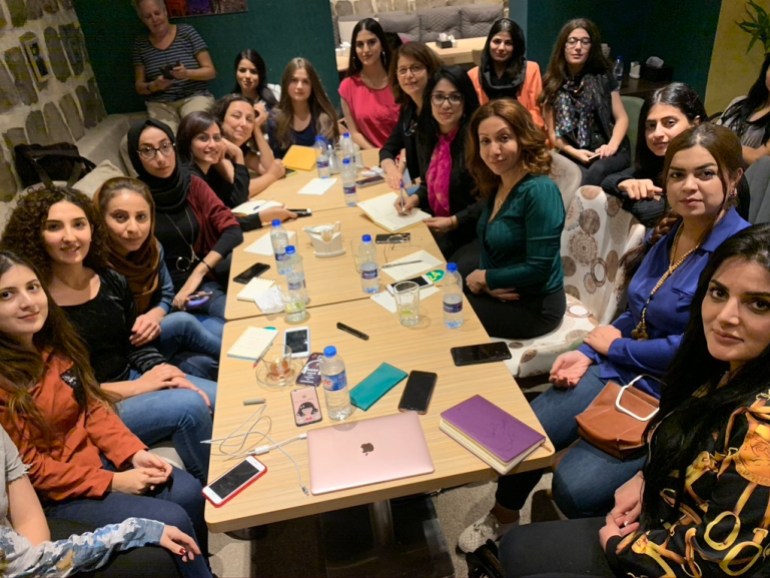
In 2017, the Sofia Society, active in a number of cities across the Kurdish region, ran a social media campaign against sexual harassment, calling on women to share photos of themselves to defy the culture of online abuse. The hashtag #Kurdistanwomenpower was used by hundreds of women.
To maintain independence and freedom of expression, the Sofia Society has chosen not to seek funding from the government, political parties or international organisations, relying on donations instead.
The women involved in the group are brave, but they also fear repercussions. All but one of the women I spoke to asked me to disguise their identities.
At a meeting with feminist activists in the KRG, in a restaurant set back from the main road where the proprietor set down tiny cups of sweet mint tea, bitter strong coffee, and mountains of bread, tahini and olives, a loud, energetic group of women, aged 16 to 70, explained what it is like to be a woman there.
Women are told they must maintain the “honour” of the family name and if they bring “shame” to the community they will be severely punished, they explained.
“That can mean that we will be killed,” one of the women, Amira, said, hitting the table for emphasis, “and the men will get away with it. But we are here to stop them getting away with it because that is wrong in any society.”
The death of Banaz Mahmod: ‘A litany of failures’
So-called “honour killing” is often assumed to be something that only happens in closed, conservative societies. But it is a crime that affects women and girls everywhere.
According to the Honour Based Violence Awareness Network (HBVAN), there are approximately 12 “honour killings” every year in the UK.
The case of Banaz Mahmod, a 20-year-old Iraqi Kurd, brought the reality of such crimes, and the danger of ignoring them, into sharp focus in the UK. Banaz, who lived in South London, was raped and strangled to death by two cousins and another man on the orders of her father and uncle in 2006 after she left her abusive husband and embarked upon a new relationship. Her body was eventually found in a suitcase buried in the garden of a derelict house in Birmingham.
Her father, Mahmod Mahmod, and uncle, Ari Mahmod, were jailed for life.
In a chilling echo of the unmarked graves in the region, Banaz was buried by her family without a headstone, in Morden, south London. A year later, a memorial service was held for her and a headstone erected – paid for by the Iranian and Kurdish Women’s Rights Organisation, police officers and the lawyer who prosecuted her case, Nazir Afzal.
Banaz’s murder was preventable. In the three months before she was killed, Banaz had sought help from the police on five separate occasions. The claims she made in her interview, that men who meant her harm were following her in the street, went unaddressed. Banaz told police her uncle had threatened to kill her, yet no plan was put in place to keep her safe. On New Year’s Eve, 24 days before she was murdered, Banaz’s father tried to kill her. The officer who was called to the scene simply did not believe what she was being told and dismissed Banaz as “manipulative” and “melodramatic”.
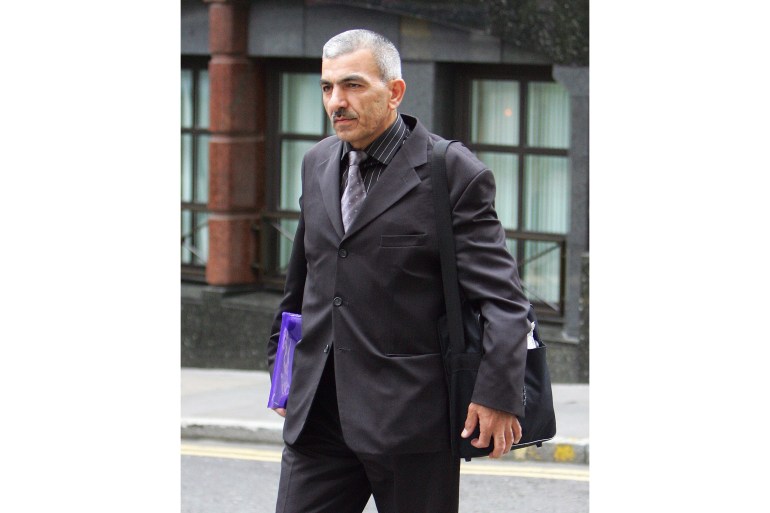
“What was the reason for this litany of failures? Lack of awareness about ‘honour-based’ violence was possibly the biggest factor,” says Caroline Goode, the police officer who led the inquiry into Banaz’s murder. “Which led to officers failing to appreciate the extreme risk to Banaz’s life and therefore to take appropriate action.”
There are – and were, before Banaz died – very clear policies for dealing with domestic violence that every officer should know. “Forget the cultural aspect, this was a straightforward allegation of domestic violence,” says Goode. “Her father had just tried to kill her. The officer had made up her mind that Banaz was a liar.”
One well-intentioned detective who wanted to help Banaz interviewed her at home in the presence of her parents, something police officers are now trained never to do.
What has changed in the UK in the 15 years since Banaz was murdered? Officers in the UK received awareness training to try to prevent other such tragedies. While awareness has improved, an inspection by Her Majesty’s Inspectorate of Constabularies five years ago found that only three out of 42 UK police forces were proficient in dealing with all aspects of “honour-based” abuse.
“The ability to recognise these crimes is critical to accurate reporting, which impacts both on a strategic and tactical level,” says Goode. “The government are currently discussing doing away with the term ‘honour-based’ abuse. While we all agree there is no ‘honour’ in killing, failure to understand the motive and how these crimes differ from other domestic violence would be a grave mistake.”
‘Preserving men’s honour’ – at any cost
Aisha K Gill, professor of criminology at the University of Roehampton who has been researching “honour-based” violence for 14 years, says the oppression that individuals – especially women – face as a result of “honour” takes different forms depending on their location, the prevailing regional culture, and their family’s relative socioeconomic status.
“Women’s bodies are key to a family’s position within the community. As a result, embodied experience is vital to understanding the lives of women both within Kurdistan and the Kurdish diaspora,” she explains.
As Gill has learned through her work, critical to this understanding is the fact that value systems linked to, and legitimised by, notions of honour and shame are not controlled by a central institution: Rather, they are spread across a number of key institutions, including the family, kinship networks, religion and the state.
“Instead of simplistically conceptualising, for example, ‘honour-based’ violence as a cultural tradition common to a range of ‘backward’ (and, thus, ‘othered’) societies,” says Gill, “the issue needs to be (re-)considered in the context of VAWG (violence against women and girls) and the patriarchal value systems found throughout the Northern and Southern Hemispheres.”
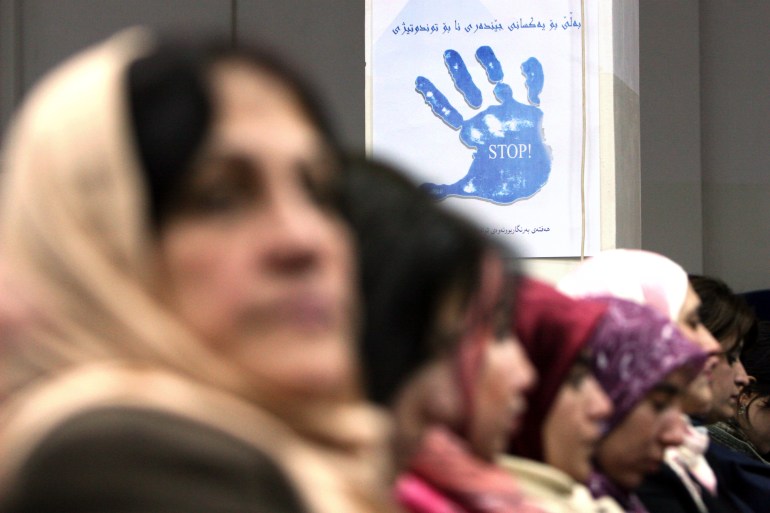
Femicide, wherever it takes place, is legitimised by the notion that men’s “honour” and reputation must be preserved at any cost, and that women are responsible for maintaining “honour” within the family.
“Honour-based” violence affects all social, cultural, religious and ethnic groups in the UK. When women are killed by partners or ex-partners there is often some kind of “honour” rationale involved, such as his belief that she “cheated” or somehow humiliated or disrespected him. In the UK, one woman every three days becomes a victim of femicide.
Violence against women is rising
Across the Kurdish region of northern Iraq, gender-based violence, including sexual violence, domestic violence, “honour crimes”, child marriages, trafficking and female genital mutilation (FGM), is on the rise. It is leading to an increasing number of Kurdish women taking their own lives, and the issue has only been exacerbated by the COVID-19 pandemic.
But the extent of the violence is often obscured by the inadequacy of the criminal justice system in prosecuting the perpetrator.
In 2018, university graduate Solina Eve attended a job interview at a women’s development NGO in Duhok, KRG, during which she said she was sexually assaulted by the manager, Mohammed Amin Hero.
Later that day, Hero called her and asked her to return to his office. Expecting an apology, Eve returned with friends who waited outside. As soon as she entered his office, Eve said she was assaulted again. She lashed out in self-defence and Hero reported her to the police.
Eve sued Hero but subsequently lost her case and was arrested for assaulting him, as well as alleged blackmail because Hero claimed she had gone to his place of work to extort money from him.
In November 2020, Eve was sentenced to six months in prison.
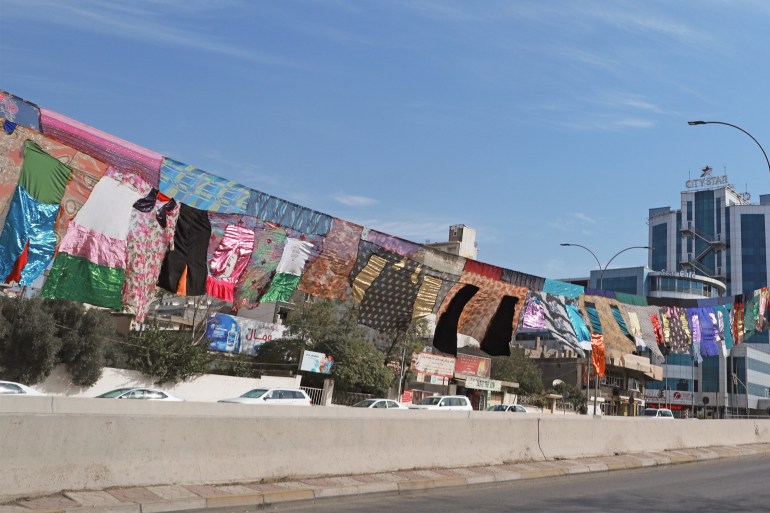
In another incident, this time in Erbil, in November 2020, a 26-year-old woman was hanged by three of her brothers and another man because she had been seen speaking to a local man. Police said the murder was “related to ‘a social issue'”.
Talabani believes that for things to improve, it is crucial to challenge false notions of innate male superiority and the subservience of women. “This change starts at home, then in the education sector. We must change the cultural norm that somehow our honour and that of our family is tied to the behaviour of someone else,” he says.
‘Outrage alone won’t eradicate these crimes’
It is not known how many women lie in unmarked graves in Sulaymaniyah and elsewhere.
“Our land is not so vast and our communities not so disconnected that a caring family could not reach the authorities to alert us to a missing family member,” Talabani explains. “So we can only assume that the families are complicit in the murders, hence the silence and the dissociation.”
He sponsored a scheme to install headstones at unmarked graves, as well as to try to identify the bodies. “I’ve instructed our DNA labs to take samples of any body found without identification,” he says. “These samples could later be used if family members ever come forward to report missing family members.”
He has also had the numbers which were the only markings on the graves removed and replaced with the word “Zhian”, which means “life”, and “Rest in peace – this is your home”.
According to Talabani, the unmarked graves may also have served to protect the perpetrators because the victims were buried before a police investigation can take place and no one except the killer or killers know where the bodies lie.
However, he insists there is “robust legislation” in place to protect women. “We have a brave and active directorate to combat violence against women and families. A hotline for victims of gender-based violence to contact to anonymously report crimes, which are swiftly acted upon, and even a newly established anti-trafficking department to stop the spread of human and child trafficking.”
“Things are moving in the right direction,” says Mahmoud, “but not quickly enough.”
There is a long way to go, but Talabani believes attitudes are changing. “There is outrage when someone is a victim of gender-based violence. There is outrage when a young girl or woman is killed by their family. This is a big change from 15 to 20 years ago when such crimes wouldn’t even make the news. But outrage alone won’t eradicate these crimes. Punishment for the perpetrators will.”
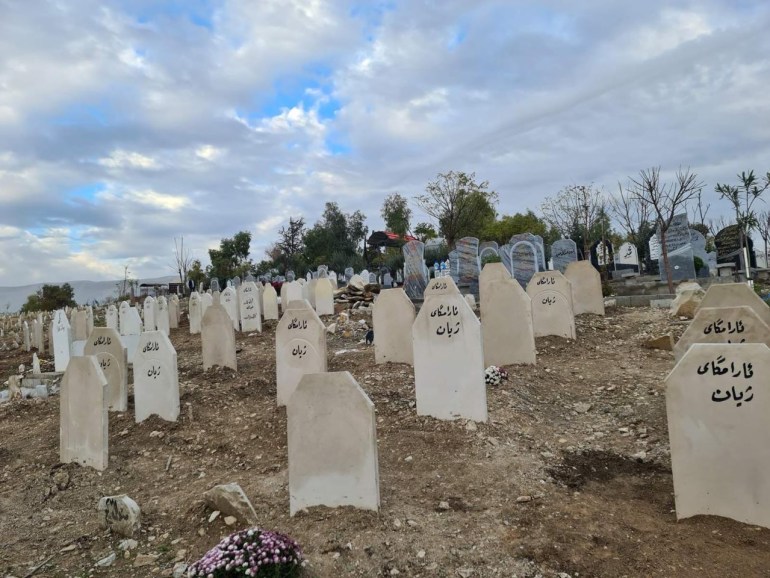
Campaigners from the Stop Killing Women Coalition (SKWC) say the number of women being murdered in so-called “honour killings” in the KRG is rising.
A number of state and religious organisations in the KRG are speaking out against “honour crimes” and violence against women in general. In November, Justice Jasem Jazaa Jaafer, president of the Sulaymaniyah Court, pledged to work with those campaigning to stop femicide.
‘We are scared for our lives’
But the law does not always help women. For example, a male relative can demand that a woman who escaped domestic violence be released by the shelter into their “care” – often putting them at risk of death.
A woman who works at a shelter on the outskirts of Erbil, who wished to remain anonymous, told me: “We take in these girls and try to protect them. But the men – brothers, cousins and even fathers – that want to kill them are given permission by the attitudes in society. We are seen as whores for defending them, and we are scared for our lives.”
There is also work to be done on how femicides are reported, and the SKWC is working with news organisations to ensure they do so responsibly.
“After a woman is killed, the media and television in Kurdistan spread propaganda making out that she deserved to die, blaming the victim for her death,” says Talabani. “She can no longer defend herself and it helps the perpetrators escape justice.”
Irresponsible and inaccurate reporting of femicides is not only a problem in the Kurdish region but also in the UK – where there have been numerous complaints about the way the media reports cases of femicide.
Recently, for example, the BBC was heavily criticised for airing a trailer for a documentary about Oscar Pistorius without even mentioning the name Reeva Steenkamp, the woman he murdered.
Forging feminist alliances
Ruwayda Mustafah is a Kurdish-born political strategist and campaigner based in the UK, specialising in Kurdish rights, women’s representation and social inequality.
“In Kurdistan, poor women would rather put up with the violence than leave and have no support,” she explained. “If you are a mother of three kids, you can’t afford to leave because the state does not require him to support you.”
Mahmoud, like other feminists from the region I have spoken to, says violence against women is not an inherent part of Kurdish culture.
“People used to be more supportive of each other and there was a political struggle going on with a vision for liberation,” she says referring to the mobilisation against dictatorship and for autonomy from the 1970s until 1991.
“Now, after 30 years of semi-autonomous government and its neglect of women’s rights, this situation has become uncontrollable,” she says.
“I was in a rage when I found out about these graveyards in Iraqi Kurdistan. My family and many others fought for the liberation of Kurdistan. We didn’t know that we would end up with a careless government and a graveyard for women.”
‘Raise their voice’
According to a number of feminist campaigners, there are dozens of women’s NGOs across the semi-autonomous Kurdish region with significant resources, but many of them have become bureaucratised. Focused on a need to meet UN or Western funding criteria, they end up failing to make a difference for the majority of Kurdish women.
Mahmoud believes the work of independent volunteer groups and people who dedicate their lives to ending male violence and supporting the victims is invaluable.
In recent years, a number of social media campaigns against “honour-based” crime and sexual assault have been launched, which have not only raised awareness among the general public but also put pressure on the Kurdish government and forced them to take action.
In 2018, there was the case of 23-year-old Sewa Qadir. Her three children, aged five, three and one, died in a house fire. Qadir survived for eight days after the fire. But as she lay dying in the hospital while her children were in the morgue, rumours circulated, seemingly started by Qadir’s estranged husband, that she had deliberately started the fire.
The case was highlighted on social media by activists, journalists, writers and civilians, which put pressure on the authorities to take action and properly investigate the crime. Qadir’s husband, Dyar Majeed, was subsequently arrested. In August last year, he was found guilty of all four murders.
“My faith in ordinary people never faded because, with every violation of women’s rights, hundreds of independent women and men raise their voice and condemn these atrocities,” says Mahmoud. “This is the Kurdistan I know and I am honoured to be struggling alongside these dignified people.”
*Name has been changed to protect anonymity